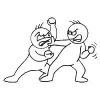Becky
Webmistress
- Joined
- Mar 25, 2003
- Messages
- 7,424
- Reaction score
- 1,511
For a long while, critics of violent video games have argued that they cause people to be more aggressive. Those in opposition claim that this is nonsense - more aggressive people are just more interested in playing violent games than less-aggressive people. It is an argument that has gone round and round in circles for a while.
However, work done by scientists at the University of Missouri-Columbia suggests that there is indeed a causal link between playing violent games and heightened levels of aggression - previously, it had been thought that there was merely an association between the two.
The research was conducted by analysing the P300 brain responses ("[which] reflects an evaluation of the emotional content of an image") of various gamers when presented with an array of images - including violent, negative ('bad' images that are not violent - for example, a sick child) and neutral images. It showed that gamers who are keen on violent games react almost the same to violent images as they do to neutral images, yet show normal responses to non-violent negative images.
According to psychologist Bruce Bartholow; "This may not be surprising - video games have been used to desensitise soldiers to scenes of war. But when the players were subsequently given the opportunity to 'punish' a fake opponent in another game, those with the greatest reduction in P300 brain responses meted out the most severe punishments."
Read more at New Scientist
However, work done by scientists at the University of Missouri-Columbia suggests that there is indeed a causal link between playing violent games and heightened levels of aggression - previously, it had been thought that there was merely an association between the two.
The research was conducted by analysing the P300 brain responses ("[which] reflects an evaluation of the emotional content of an image") of various gamers when presented with an array of images - including violent, negative ('bad' images that are not violent - for example, a sick child) and neutral images. It showed that gamers who are keen on violent games react almost the same to violent images as they do to neutral images, yet show normal responses to non-violent negative images.
According to psychologist Bruce Bartholow; "This may not be surprising - video games have been used to desensitise soldiers to scenes of war. But when the players were subsequently given the opportunity to 'punish' a fake opponent in another game, those with the greatest reduction in P300 brain responses meted out the most severe punishments."
Read more at New Scientist





